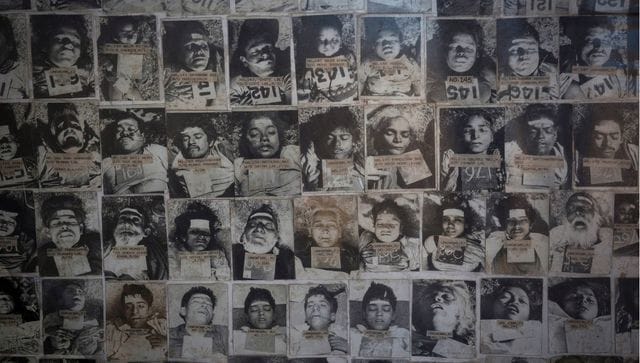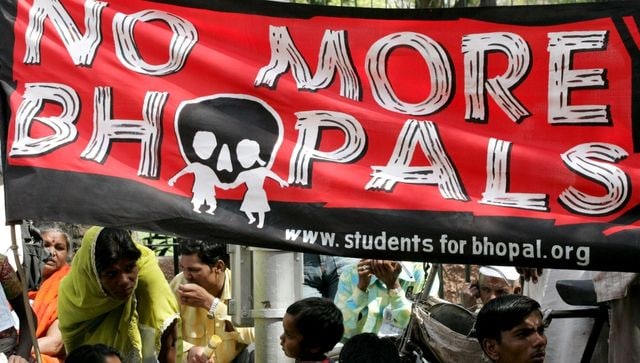The Supreme Court has rejected the Central government’s curative petition seeking Union Carbide Corporations’ (UCC) successor firms to pay additional compensation to victims of the 1984 Bhopal gas tragedy.
Dismissing the plea, a Constitution Bench of Justices Sanjay Kishan Kaul, Sanjiv Khanna, Abhay S Oka, Vikram Nath and JK Maheshwari said reopening the case after two decades would only open Pandora’s box and will be “detrimental” to the claimants.
What was the Bhopal gas disaster, why did the Centre file a curative petition and why has the top court rejected it? We explain.
Bhopal gas tragedy
On the intervening night of 2 and 3 December 1984, highly toxic methyl isocyanate gas leaked from American company Union Carbide’s pesticide factory in the Madhya Pradesh capital.
Around five lakh people were exposed to the poisonous gas, with most complaining of breathing issues, coughing, and irritation in the eyes and skin.
India Today notes that the villages and slums near the factory were the worst affected by the gas leak.
It was one of the worst humanitarian and environmental disasters in the world.
As per the official figures, the death toll was at 5,295, while another 5,68,292 suffered injuries in Bhopal, as per ANI.

Following the Bhopal disaster, the Indian government sued Union Carbide and the company agreed to pay a compensation of $470 million (around Rs 715 crore) in damages in 1989.
Notably, in March 1985, the Centre had passed the Bhopal Gas Leak Disaster (Processing of Claims) Act that granted the government exclusive right to represent the victims.
Thousands of survivors of the industrial disaster have said they and their families are still suffering from chronic health problems due to the leak and the leftover toxic waste, as per Reuters.
ALSO READ: 1984 Bhopal gas tragedy: Four decades on, no closure in sight for victims
Centre’s curative plea
In December 2010, the Central government filed a curative petition in the Supreme Court demanding an enhanced compensation of over Rs 7,400 crore from Union Carbide Corporation, which is now owned by Dow Chemicals.
The government argued that the earlier settlement of Rs 715 crore was inadequate as it was based on an incorrect estimate of the total number of deaths, injuries, and damages and did not take into account the eventual environmental degradation, reported Indian Express.
In January this year, Attorney general R Venkataramani, representing the Centre in the case, said that the government was seeking additional compensation as the 1989 settlement relied on “incorrect and wrong assumption of facts and data”.
The Supreme Court started hearing the plea in January and questioned the Centre for not filing a review petition on the settlement.

The apex court told the government on 11 January that “it is very easy to dip into someone else’s pocket and take out the money. Dip into your own pocket and give the money and then see if you can dip into their (UCC) pocket or not”.
As per Hindustan Times, the bench added: “At that time [when the settlement was agreed upon by the government in 1989], a closure was contemplated. A review petition was also brought which ended in 1991. Now, can we keep opening the same wounds time and again?”
Senior counsel Harish Salve and Sidharth Luthra, appearing for the company, argue that UCC’s successor firms cannot be asked for additional compensation beyond the settlement amount which was agreed upon by their client and the Government of India in 1989.
On 12 January, the bench reserved its order on the Centre’s curative petition.
Supreme Court dismisses plea
Announcing its verdict in the matter today (14 March), the Supreme Court denied reopening the settlement case, saying the compensation was found to be in “surplus of the actual requirement”.
The five-judge bench also rapped the Centre for not setting up an insurance policy for the survivors of the disaster. “Responsibility was placed on the Union of India, being a welfare state, to make good the deficiency and to take out the relevant insurance policy. Surprisingly, we were informed that no such insurance policy was taken out. This is gross negligence on part of the UOI and is in breach of the directions made in the review judgment. The Union cannot be negligent on this aspect and then seek a prayer from this court to fix such responsibility on the UCC,” the court said, as per Indian Express.
The top court said the settlement can be set aside only in case of fraud, which was not the case here.
The Centre has not offered any “rationale” for propping up the issue decades later, the bench stated. “We are equally dissatisfied with the Union of India being unable to furnish any rationale for raking up this affected issue more than two decades after the incident”.
“The sum of Rs 50 crores lying with the Reserve Bank of India (RBI) shall be utilised by the Government of India to satisfy pending claims,” the apex court said in its judgement, as per ANI.
With inputs from agencies
Read all the Latest News, Trending News, Cricket News, Bollywood News,
India News and Entertainment News here. Follow us on Facebook, Twitter and Instagram.
from Firstpost India Latest News https://ift.tt/rbO7NzB


0 Comments